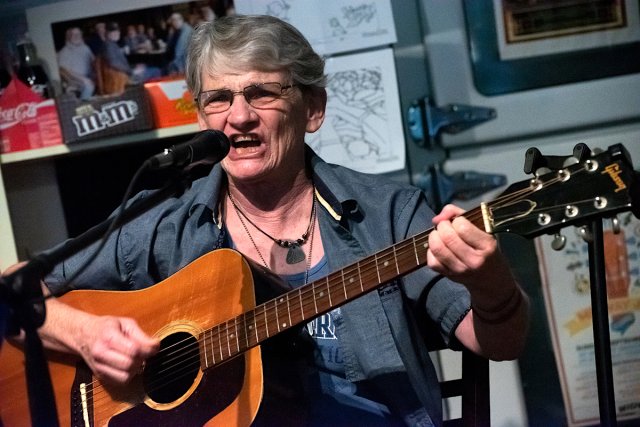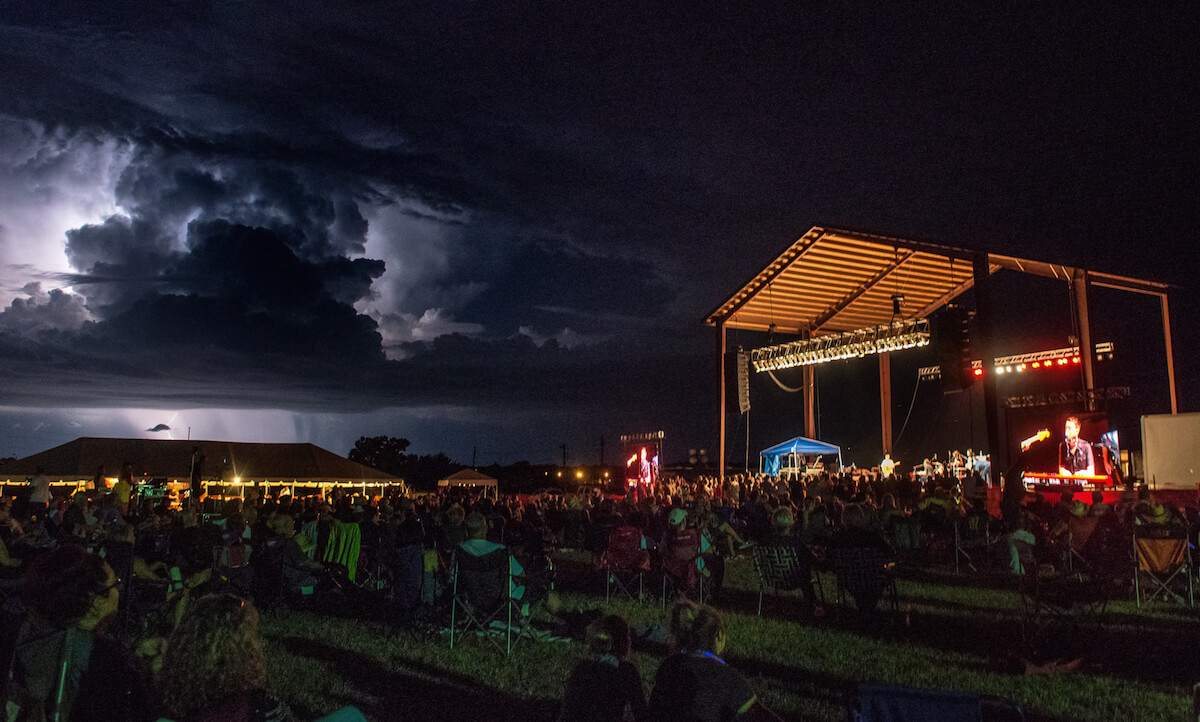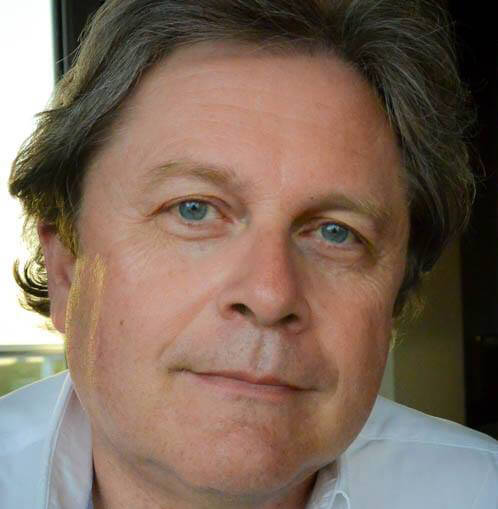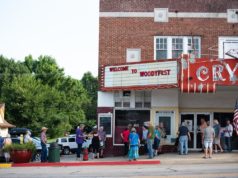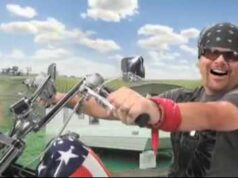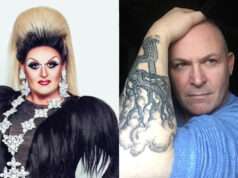
Peggy Johnson folded away her Navy whites. She packed up her civies, a guitar and the frying pan her mother had given her, and she headed west in her little ‘72 Datsun pickup camper, shaken by what had happened and not knowing what to find, what to do or even where her journey might end.
It was 1982, and the 24-year-old Macon, Georgia, woman had been living a career of hope and purpose on board the U.S.S. Puget Sound, a destroyer tender that had taken her to Italy and Yugoslavia and Spain and other ports around the world. She worked as a Navy journalist and sang in the ship’s rock band. Her service had begun with her enlistment “during a streak of patriotism” three years before, during the Iran Hostage Crisis.
Well, that and her girlfriend had joined the Navy. Johnson would always follow love.
Then it came to an abrupt end.
She and her friends had fretted for weeks over the question. One day at their home port in Gaeta, Italy, it came from her superior officer. And like she had been taught back home and like a good soldier was to do, she told the truth.
Yes, she answered, she was homosexual. The Navy replied: Peggy Johnson was no longer welcome in the service.
And so, with a wounded state of mind, Johnson was shipped stateside to Philadelphia, where she then followed her girlfriend, also unceremoniously mustered from the Navy ranks, to this place called Oklahoma, a place Peggy had never seen. She thought she would stay a month or two, to figure out what to do. It’s now been a 37-year residency.
The move to Oklahoma began a life of love and heartache. A life of struggle and peace. All those things that make for good songs, the kind that get you thinking and wondering and sometimes feeling angry and sometimes feeling sad.
“I had met good people. I had excelled in the Navy. But getting kicked out was really a major blow and I didn’t handle it well. It probably made me into a protest singer,” said Johnson, 61. “After all, what did I have to lose? So I got into lesbian political politics.”
On stage 11 a.m. Saturday at the Crystal Theater in Okemah, Johnson will sing her songs and play her Gibson J45 guitar at the Woody Guthrie Music Festival, commonly called “WoodyFest.”
Afterward, she will be part of a 2 p.m. panel at the Okemah History Center titled “Something to say — Making music that matters.” The discussion is set to focus on musical artists using their craft to educate listeners and draw attention to social and cultural issues. The panel includes Red Dirt Rangers singer John Cooper.
‘I’m a lesbian feminist warrior poet doing my work’
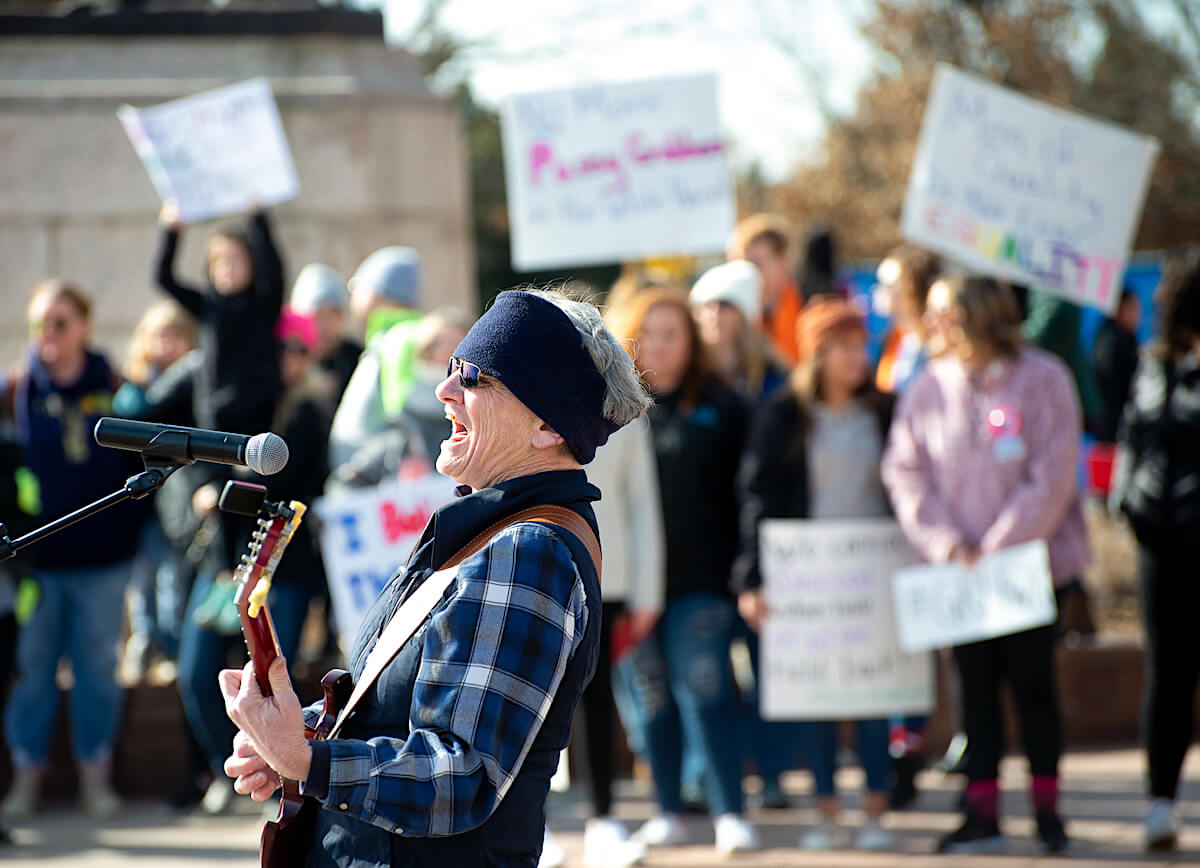
Johnson is known in local circles as the “protest singer” of present-day Oklahoma, a label she accepts, but not without letting folks know she is more than that. Her path to singer-songwriter success has been a long one.
WoodyFest
July 12-14
Okemah, OklahomaMore than 70 singers, songwriters and bands are set to perform during the annual festival that plays homage to Woody Guthrie, the small town’s singer songwriter.
When Johnson arrived in Oklahoma, she quickly learned that a discharge from the Navy for being gay was not conducive to employment — not in the 1980s, anyway. She struggled to find work, eventually landing a job as the salad lady at Western Sizzlin’ in Oklahoma City.
She also became active in local feminist groups. At meetings ,she heard others tell their stories of rape and abuse.
“It was consciousness raising and very empowering,” she said.
When her like-minded friends, who she calls her “core group of lesbian feminists,” saw she could play a guitar and sing, it made sense that she would be drafted as the protest singer for the Take Back the Night rally in Oklahoma City in the 1980s, where marchers brought attention to those injustices.
It was the beginning of Peggy Johnson, Protest Singer.
“I’m a lesbian feminist warrior poet doing my work, come to ask you, are you doing yours?” Johnson said, paraphrasing poet, feminist and civil rights activist Audre Lorde. “At least I’m that sometimes. That’s probably my personal personna. People think of me like that.”
Since that first rally, Johnson has inspired the troops at fundraisers for AIDS victims, the Women’s March, pro-choice and pride events and for countless other causes and candidates consistent with her own personal and political views.
It isn’t just the words she sings, but how she delivers them. Think Bob Dylan’s message with Janis Joplin’s delivery.
“Janis was a big influence — like Southern Comfort and screaming at the top of your lungs. But, I don’t always want to be the ‘up tune’ in the house. Although sometimes it is left to me. I’m the one who is going to play the ‘up tune’,” Johnson said.
“Aurora,” an anti-gun culture song she wrote after the 2012 mass shooting in Colorado, has the chorus “Guns, guns, guns, guns, guns!” with a staccato of such force that can feel like bullets.
RELATED
WoodyFest: ‘This really is a family reunion’ by Michael Duncan
Her songs are what one fellow songwriter called “lyrically direct.”
“You’re not going to have to wade through a lot of literary devices searching for meaning when she sings. Not to say Peggy lacks subtlety, but I think she’s a courageous communicator who gets her point across adroitly,” said folk singer-songwriter T.Z. Wright, who is scheduled to perform at WoodyFest’s Hen House stage 11:30 a.m. Friday.
Susan Herndon is set to take the same stage 12:30 p.m. Saturday.
“Peggy is not afraid to tell it like it is, and that’s why I love her,” Herndon said. “She’s not out to make a pretty pill for you to swallow, although she can do pretty songs too when she wants. She goes straight to the heart.”
From lawyer to letter carrier
To understand where Johnson finds the fuel to speak her mind through song, it’s important to know her history. Beyond her discharge from the Navy, she fought battles with alcohol and depression.
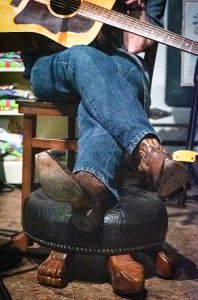
When traveling the music circuit did not pan out for her in the 1980s, Johnson began work as a paralegal for Oklahoma City immigration lawyer Rex Friend, hoping to contribute to a worthy cause. Then she got the idea to do more as an advocate. She returned to college to get her bachelor’s degree and was admitted to the University of Oklahoma College of Law. She graduated with her J.D. in 1995.
“I decided I wanted to be the lawyer without much forethought about what that meant,” Johnson said. “It made my family happy, and they hadn’t been happy for a long time.”
But law school lacked enjoyment for her. Practicing law afterward wasn’t much better. She learned that lawyers wade through a lot of bull and baloney before they get to tilt windmills — assuming those clients ever show up. For Johnson, they didn’t. But student loan bills did.
Near financial ruin, Johnson spiraled into a “nervous breakdown” that ended her law practice, stopped her music career, yet somehow did not result in her hospitalization.
“Probably anyone else would have been,” she said. “But I seem to have this innate ability to keep going.”
She heard the post office was hiring.
“I don’t know how it happened. It had a good paycheck,” she said.
Johnson found herself delivering door-to-door as a mail carrier for 15 years, an “alone” job with plenty of time to reflect. It also gave her a routine that allowed her to revisit music.
She currently works at the post office on West Covell Avenue in Edmond. It has placed her with a set of people of differing political persuasions — an environment that feeds Johnson’s need for diversity, even if it means rubbing elbows with people who might find her too different for their own tastes. It also means Googling football scores on Monday morning so she can engage in conversation with co-workers. She says she is still more comfortable there.
“I’m not a sheltered person. I don’t just hang out with like-minded people. I work with the general public,” Johnson said. “I don’t want to make a WalMart plug, but everybody ought to shop at WalMart every few months so you will see all sorts of different people, not just the white people that shop at Target.”
“It’s hard to get out there and present yourself when you’re kind of different from what people expect a person to be. I’m not much of a mainstream person, although I know people way less mainstream for various reasons. I don’t fit in anywhere in my mind, but I can fit in. It is something I have learned how to do,” she said.
In some ways Johnson is a personification of a characteristic of her songs — what songwriters call the technique of “false rhyme.” In the tune High School Senior, she sings:
I used to drive around in my brother’s Mazda. Every 10 minutes I took an ol’ swig of Vodka.
Listeners must stay alert to the words she sings, not knowing what to expect from the next line of Johnson’s songs.
“That’s what I listen for in music. Are you just rendering the song, or are you inviting me into your song and telling me a story that I don’t know where it is going. Sometimes it’s just a little twist and there is a surprise and if you’re not listening you will miss it,” she said.
‘I’m an atheist who has a higher power I call God’
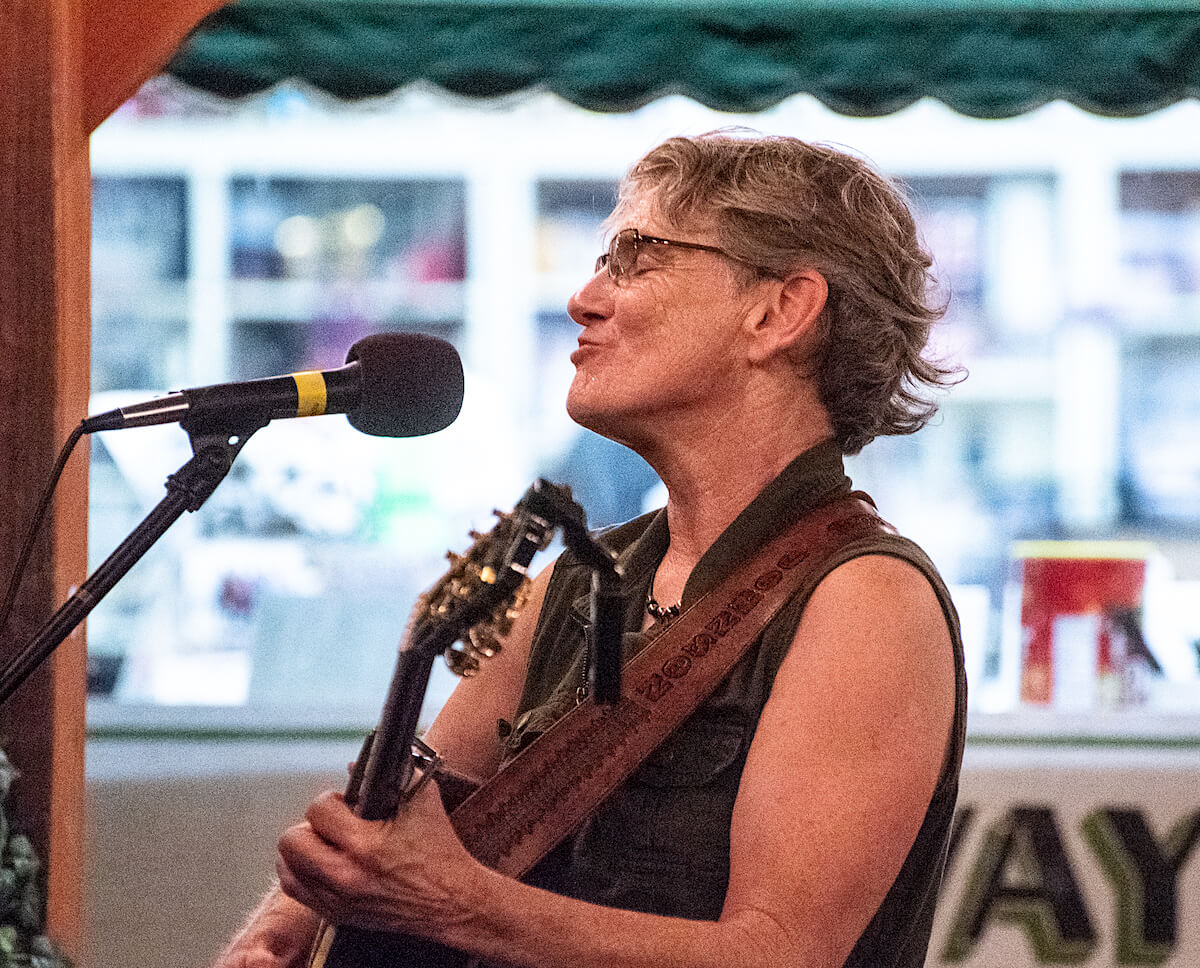
Today, Johnson finds herself in a peaceful place.
One of her life stories can be found in the song Dustbowl Lullaby, a story of real friends she met when she came to Oklahoma.
Now some years later I’m like a sailor washed ashore. The questions I was asking then don’t need answers any more. Found the people I was looking for back in lonely days gone by. I found them in the prairie land. Dustbowl Lullaby…. I found them without looking. They snuck in on the sly. Singing loud and clear and free, Dustbowl Lullaby.
“What else is going to keep you in Oklahoma except for the people?” Johnson said. “I met the best people that Oklahoma has to offer. And I’ve met some of the others too.”
Some of her friends are members of the Church of the Open Arms, a congregation accepting of the LGBTQ community.
“I will always do something for them. They are good people. But I’m just not a Christian,” said Johnson, who was reared in an Episcopalian family. “I came up with a term for myself a few months ago. It makes absolutely no sense, but it makes about as much sense as Christianity. I’m an atheist who has a higher power I call God.”
Johnson said she is comfortable not knowing all of the answers.
“I know a lot about myself now. Quite a bit more than I knew when I came here,” she said. “Strangely, though, I don’t feel like an Okie. I should. I’ve lived here longer than I lived in Georgia or anywhere else.”
Today, Johnson lives in a small frame house on Oklahoma City’s north side with four rescue dogs, including her prized one-eyed Chihuahua, Pipsi.
“I used to be a cat person only. I wanted to like dogs, so I worked on it for years,” she said. “Then I became a Chihuahua person, and that’s just bizarre. That’s as bizarre as joining the Navy and going to law school.”
(Correction: This story was updated at 9:10 a.m. Thursday, July 11, 2019, to reflect the correct reference to the artist’s Gibson guitar.)








